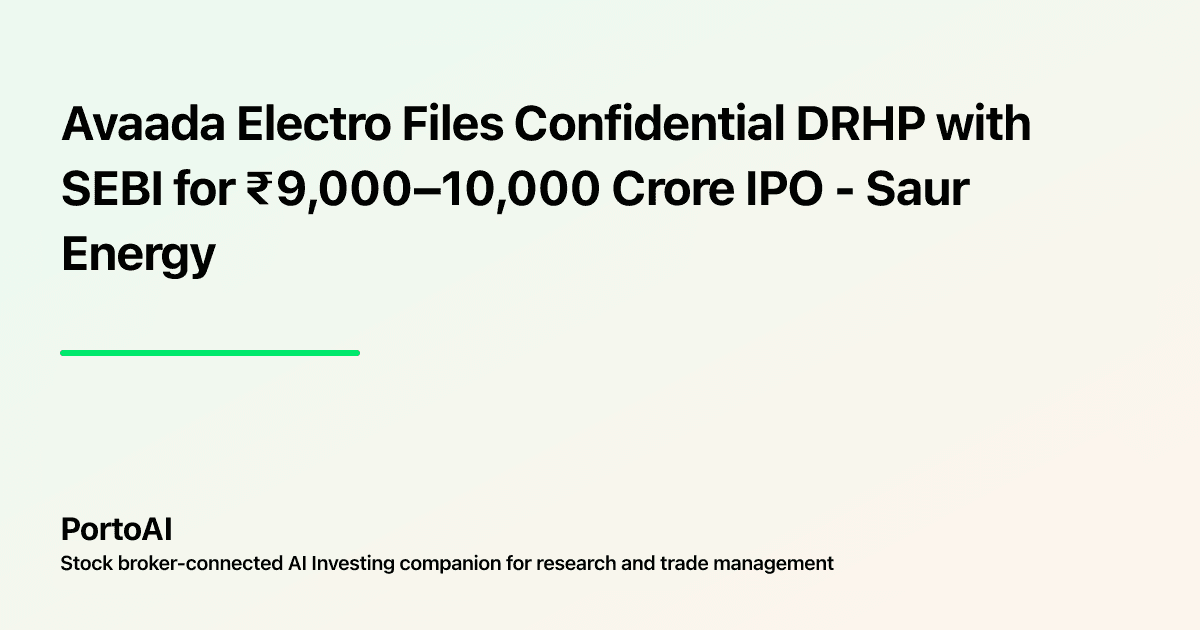What Are Corporate Bonds? A Data-Driven Investor's Guide

Venkateshwar Jambula
Lead Market Researcher
3 min read
•Published on September 28, 2024
•Understanding Corporate Bonds: A Data-Driven Investor's Guide
In the complex landscape of financial markets, understanding the nuances of various debt instruments is crucial for building a resilient and profitable portfolio. Corporate bonds, a cornerstone of fixed-income investing, represent a vital component for sophisticated investors seeking income, diversification, and capital preservation. At PortoAI, we believe in empowering you with the data-driven insights necessary to navigate these opportunities with confidence.
What Exactly Are Corporate Bonds?
At their core, corporate bonds are debt securities issued by companies to raise capital. When you purchase a corporate bond, you are essentially lending money to the issuing corporation. In return, the company promises to pay you periodic interest payments (known as coupons) at a fixed or floating rate and to repay the principal amount on a specified maturity date. Unlike equity investments, bondholders do not gain ownership in the company; they are creditors, not owners.
Companies typically issue bonds to fund operational expansion, finance new projects, acquire other businesses, or manage existing debt obligations. This mechanism allows businesses to access significant capital without diluting equity.
Key Characteristics of Corporate Bonds
To effectively evaluate corporate bonds, it's essential to understand their defining features:
- Interest Payments (Coupons): Bonds can offer either a fixed coupon rate, which remains constant throughout the bond's life, or a floating rate, which adjusts based on a benchmark interest rate (e.g., LIBOR or SOFR). Floating-rate bonds can offer protection against rising interest rate environments.
- Maturity Date: Each bond has a predetermined maturity date, which is the date on which the principal amount is due to be repaid to the bondholder.
- Credit Ratings: Independent agencies like Standard & Poor's (S&P), Moody's, and Fitch assess the creditworthiness of bond issuers and the bonds themselves. These credit ratings are critical indicators of the likelihood of default, ranging from investment-grade (lower risk) to non-investment-grade or 'junk' (higher risk).
Using tools like the PortoAI Market Lens, investors can access real-time credit rating changes and issuer financial health metrics to stay ahead of potential credit events.
Why Incorporate Corporate Bonds into Your Investment Strategy?
Corporate bonds offer compelling advantages for investors aiming for a balanced and diversified portfolio:
- Portfolio Diversification: By investing across different industries and economic sectors through corporate bonds, you can reduce overall portfolio risk. This diversification helps mitigate the impact of sector-specific downturns.
- Income Generation: Corporate bonds provide a predictable stream of income through regular coupon payments, often made semi-annually. In environments where yields are attractive, they can be a significant contributor to total returns.
- Potential for Higher Yields: Compared to government bonds, corporate bonds often offer higher yields to compensate investors for the increased credit risk. The yield is influenced by the coupon rate, the issuer's credit quality, and prevailing market prices.
- Liquidity: Many corporate bonds trade in active secondary markets, offering a degree of liquidity that allows investors to sell their holdings before maturity if needed.
Navigating the Types of Corporate Bonds
Understanding the different structures of corporate bonds can help you select instruments that best align with your investment objectives:
- Secured Bonds: These bonds are backed by specific company assets, providing a layer of security for bondholders. If the issuer defaults, these assets can be liquidated to repay bondholders.
- Unsecured Bonds (Debentures): These are not backed by specific collateral. Their repayment relies solely on the issuer's general creditworthiness and ability to generate cash flow.
- Zero-Coupon Bonds: These bonds do not pay periodic interest. Instead, they are sold at a significant discount to their face value, and the investor receives the full face value at maturity. The return is realized as the difference between the purchase price and the face value.
- Bonds with Call Provisions: The issuer retains the right to 'call' or redeem the bond before its maturity date. This is typically exercised if interest rates fall, allowing the company to refinance its debt at a lower cost.
- Bonds with Put Provisions: Conversely, bondholders may have the right to 'put' or sell the bond back to the issuer before maturity. This provision can be valuable if interest rates rise or the issuer's credit quality deteriorates.
Understanding the Risks Associated with Corporate Bonds
While offering attractive benefits, corporate bonds are not without risk. A thorough understanding is paramount for informed decision-making:
- Interest Rate Risk: Like all fixed-income securities, corporate bonds are susceptible to fluctuations in market interest rates. When rates rise, the market value of existing bonds with lower coupon rates tends to fall.
- Credit Risk (Default Risk): This is the risk that the issuing company may be unable to meet its debt obligations, leading to missed interest payments or failure to repay the principal. The PortoAI risk console provides sophisticated tools to assess and monitor credit risk across your bond holdings.
- Company-Specific Risk: In the event of bankruptcy or liquidation, bondholders face the risk of losing their entire investment, including both principal and accrued interest. This underscores the importance of rigorous due diligence on the issuer's financial health.
Conclusion: Informed Decisions with PortoAI
Corporate bonds play a critical role in a diversified investment portfolio, offering income, diversification, and the potential for capital appreciation. However, their effective utilization requires a deep understanding of their features, types, and inherent risks. By diligently assessing credit ratings, understanding market dynamics, and leveraging sophisticated analytical tools, investors can make more informed decisions.
PortoAI is designed to equip you with the advanced AI-powered research capabilities needed to analyze corporate bonds and other securities with unparalleled precision. Empower your investment strategy with data-driven insights and navigate the markets with greater confidence.
Blog
Investment Insights and Tips
Explore our latest investment strategies and insights.

Stocks
Suzlon Energy Q2 FY26 Results: PAT soars 538% YoY to Rs 1,279 crore, highest in 30 years; revenue jumps 85%
Suzlon Energy, an Indian renewable energy solutions provider, reported a record-breaking performance for Q2 FY26, with consolidated Profit After Tax (PAT) surging 538% year-on-year to Rs 1,279 crore, marking its...
Venkateshwar Jambula
November 5, 2025
•4min

Stocks
Groww IPO set to open: Does valuation and GMP leave room for any listing gains?
Groww’s Rs 6,632 crore IPO, one of India's biggest fintech listings, is met with cautious optimism. While strong fundamentals and profitability are noted, a steep valuation and regulatory uncertainty could...
Venkateshwar Jambula
November 4, 2025
•5min

Stocks
Softbank-backed Meesho, Zomato-backed Shiprocket among 7 companies to get Sebi's approval for IPO launch
India's capital markets regulator, Sebi, has granted approval for the launch of Initial Public Offerings (IPOs) to seven companies, including prominent e-commerce players Meesho (Softbank-backed) and Shiprocket (Temasek-backed). These approvals...
Venkateshwar Jambula
November 4, 2025
•5min

Stocks
Avaada Electro Files Confidential DRHP with SEBI for ₹9,000–10,000 Crore IPO - Saur Energy
Note: Broker connections are subject to availability and your broker’s terms.
Venkateshwar Jambula
November 2, 2025
•6min